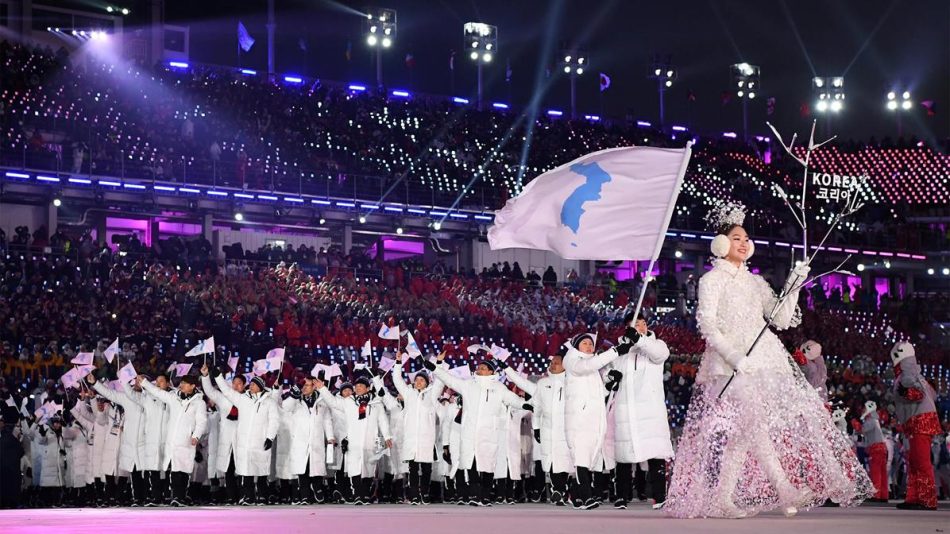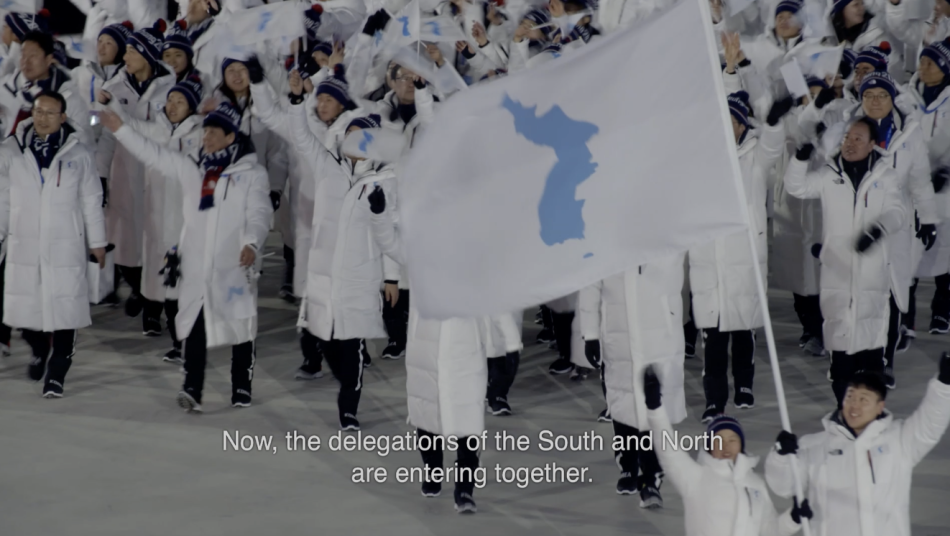Moving towards peace and solidarity through sport

International Olympic Committee
03 Apr 2023 – Ahead of the International Day of Sport for Development and Peace (IDSDP) on 6 April, sportswriter Alan Abrahamson describes the contribution made by the International Olympic Committee (IOC) and the Olympic Movement towards solidarity and peace. He highlights the Olympic Winter Games PyeongChang 2018 and Olympic Solidarity as critical in sparking real change in a world divided by conflict and ideological differences.
It was cold, very cold, the night of the Opening Ceremony of PyeongChang 2018. But spirits were lifted when delegations from North and South Korea marched into the stadium, unified, raising hopes for peace on a peninsula long divided and sparking faith that sport could help deter, if not diminish, a geopolitical confrontation crackling with fear of nuclear doom.
In recent history, this scene – indeed, this spectacle from the 2018 Games, which then saw the mixed North and South Korean women’s ice hockey team competing together – marked a vivid example of what the Olympic Charter makes explicitly clear is the aspirational goal of Olympism and the Olympic Movement. That sport can move our world towards peace.
Nurturing difference-makers
Nelson Mandela famously said: “Sport has the power to change the world. It has the power to inspire. It has the power to unite people in a way that little else does.”
Such moments as the Opening Ceremony of PyeongChang 2018 serve, with the insight of Mandela’s words, as inspiration for the hard work of change. That hard work is often found at the grassroots level, far away from the spotlight. That is the real promise and potential of the Olympic Movement at its best: one-to-one change.


To view video click HERE
We have seen with the IOC-driven Olympic Solidarity programme how difference-makers can come in the form of young people striving to compete in the Olympic Games. And we have seen the impact that initiatives introduced by Federations, National Olympic Committees (NOCs), NGOs, community activists and more around the world have had in inspiring lasting change.
Levelling the playing field
Since the 1960s, the IOC had envisioned a solidarity programme to try to level the playing field in developing nations. Television money in the 1980s made it real. Olympic Solidarity now represents one of the Movement’s most important initiatives. For the 2017-20 period, Olympic Solidarity support reached 25,000 athletes and more than 13,500 NOC activities, including 3,000 athlete scholarships and 1,600 coach and administrator training courses.
The challenge of measuring real change effected through sport, however, is that all too often it can’t be measured in these sorts of numbers. One way to consider the impact of the joint Korean march is this: Chaelin Park and Susie Jo, both of whom played on the 2018 women’s ice hockey team, have been working towards earning a graduate degree in sports management at Seoul National University in what’s called the Dream Together master’s programme, an initiative tied to the PyeongChang Games.
Sending the strongest of messages
In Beijing, at the close of the 2022 Olympic Winter Games, IOC President Thomas Bach said: “Give peace a chance.” In Lillehammer in 1994, referring to the 10th anniversary of the Sarajevo Games, with violence raging in the Balkans, then-President Juan Antonio Samaranch said: “Our message is stronger than ever. Please stop the fighting. Stop the killing. Drop your guns.”
To that end, IOC staff have been hard at work over the years. In Sarajevo, the sports hall would be rebuilt, and the IOC would set up a new NOC. In the far reaches of the Pacific Ocean, Timor-Leste became independent in 1999 – and sent four athletes to Sydney 2000, which later served as the basis for a proper sports system, and recognition in 2003 of an NOC. That same year in Iraq, after the fall of Saddam Hussein, the IOC sent a delegation to start reconstruction of the nation’s sports system – and to get a team to Athens 2004, which it did, with the men’s football team reaching the bronze-medal match.
Sparking real change
Beyond the IOC, countless difference-making groups operate around the world. For example, Generations for Peace (GFP), based in Amman, Jordan, under the leadership of current IOC Executive Board member HRH Prince Feisal Al Hussein and chief executive Mark Clark, has since 2007 used sport – in more than 50 countries wracked by conflict – to help build tolerance, respect and inclusion.
A keyword in the GFP approach is a method it calls “cascading”. Not so much water rushing down a fall, more spreading out in a circle, like after a pebble has been thrown in a lake. This is GFP-talk for what happens when someone now understands that in a football match, the rules are the same everywhere in the world, and the person on the other team is not an enemy but a competitor. This is where it all starts, and when it starts, one person can pass on that understanding to another, and then another and another, and so on. This is one-to-one change. Real change.
This is an edited version of an article originally published and written by Alan Abrahamson in the Olympic Review.
The above-mentioned efforts closely align with the IOC’s Olympism365 strategy, aimed at strengthening the role of sport as an important enabler for the Sustainable Development Goals (SDGs) – and in particular the priority area of sport, peace and safe communities. The focus on peace and solidarity through sport is also reflected in the work of the Olympic Refuge Foundation, which ensures that young people affected by displacement thrive through sport.





